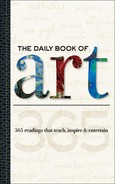Aristotle (384-322 BCE)
ART AS INSPIRATION
“...generally art partly completes what nature cannot bring to a finish, and partly imitates her.” —Aristotle, Ethics; Book II, pt. 8

In some ways, the Greek philosopher Aristotle agrees with his teacher Plato. He grants that most art is imitative in nature and that beauty is dependent on a proper balance and ordering of measurements. He also recognizes art’s capacity to incite enthusiasm in an individual. However, unlike Plato, who sees art’s powers of persuasion as a threat to society, Aristotle admires its ability to affect people’s thoughts and emotions.
He is fascinated by the way humans respond to and interact with art, especially poetry and epic tragedy, pointing out that while fictional stories may not correspond to factual events, they can still contain universal truths. In such a way, Aristotle believes art can actually improve on that which it imitates.
In Poetics, he explains that people gravitate toward art because they see it as a reflection of their own lives or of human existence in general. In many cases, art may offer empathy and consolation to its recipient. At other times, it can inspire people or even, as in the case of tragic drama, illuminate the perils of foolish behavior.
The experience of painting, poetry, or music can provide us with a better understanding of our purpose and predicament. Aristotle believes that when created nobly and performed with masterful technique, art can foster moral growth and an overall improvement of society. —CKG
QUESTIONS TO PONDER
• Has an experience of art ever inspired you to change your character or behavior?
• Should all art strive to reflect universal truths about human life?

